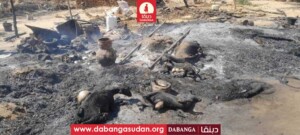ACJPS: Situation of Eritrean refugees in Sudan deteriorating
Eritrean asylum seekers in eastern Sudanese refugee camps used to face excessive violence by the Sudanese police, and by human trafficking gangs who raid the camps to kidnap refugees. New developments have made their life even worse.
The international community and Khartoum should intervene to reverse the increasingly widening area of human trafficking in eastern Sudan and mistreatment of Eritrean asylum seekers in the country, the New York-based African Centre for Justice and Peace Studies (ACJPS) said in a report on Friday.
 Eritrean asylum seekers caught by the police in eastern Sudan (ACJPS)
Eritrean asylum seekers caught by the police in eastern Sudan (ACJPS)
Eritrean asylum seekers in eastern Sudanese refugee camps used to face excessive violence by the Sudanese police, and by human trafficking gangs who raid the camps to kidnap refugees. New developments have made their life even worse.
The international community and Khartoum should intervene to reverse the increasingly widening area of human trafficking in eastern Sudan and mistreatment of Eritrean asylum seekers in the country, the New York-based African Centre for Justice and Peace Studies (ACJPS) said in a report on Friday.
According to the UN refugee agency (UNHCR), the estimated number of Eritreans who enter the Sudan every month via these border crossings is about 2,500. Other UNHCR statistics put the number of Eritrean refugees in camps in Eastern Sudan (those fleeing compulsory conscription back home or looking for better opportunities elsewhere) to 2,000 monthly. Many of those refugees are smuggled into Khartoum, the Middle East, or Europe.
Militia, criminal courts
Illegal immigration and movement of human trafficking gangs in eastern Sudan became rampant between 2007 and 2014, ACJPS states. As the smuggling routes then changed because of political developments, and Sudan committed itself to halt the stream of refugees and migrants smuggled through its country to Egypt and Libya, Eritrean refugees have been increasingly brought before criminal courts and sent back to the country they fled – with dire consequences.
Eritreans who are forcibly deported to their country may be subjected to torture, and face imprisonment for up to 14 years, the African Centre says.
In June 2015, Adam Jamaa was appointed governor of Kassala state, bordering Eritrea. He soon announced his plans for addressing illegal immigration in eastern Sudan, by instructing the Rapid Support Forces (RSF), Sudan’s main militia, to halt human trafficking in the region.
Criminal courts in the state began to issue orders to forcibly deport Eritrean refugees to their home country. A reliable source told ACJPS that Jamaa had personally directed the courts to do so, which, the research centre says, indicates coordination between Sudan and Eritrea governments concerning this issue.
In 2017, ACJPS recorded three court decisions, ordering the deportation of 170 Eritrean asylum seekers to their home country. The report further presents in detail 15 cases of abuse of Eritrean nationals by the Sudanese authorities.











 and then
and then